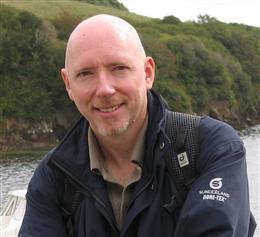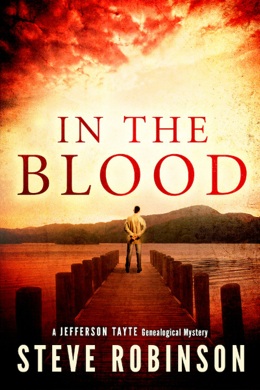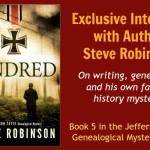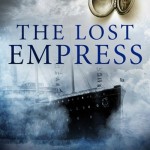 Exclusive Interview with Steve Robinson, Author of the Genealogical Crime Mystery Series
Exclusive Interview with Steve Robinson, Author of the Genealogical Crime Mystery Series
When it comes to contemporary British mystery novels and genealogy, it doesn’t get much better than author Steve Robinson’s newest addition to the Genealogical Crime Mystery Series, The Last Queen of England . Brew a perfect pot of tea, set a scone on your grandmother’s china, and settle down in front of the fire with American genealogist Jefferson Tayte, on the trail of the biggest mystery since the fate of the Princes in the Tower.
Introduced to readers in Robinson’s debut novel, In the Blood , Tayte, or J.T., is an slightly pudgy researcher from Washington, D.C. who arrives in London to visit an old friend and finds himself on a quest to find a murderer. More than one person wants to know what Tayte’s genealogist friend had uncovered in his latest research, and J.T. soon realizes that it will take fast feet, a keen knowledge of British history, and the best genealogical minds in Britain to unravel the truth.
With historian Professor Jean Summer acting as history coach and sympathetic companion, J.T. retraces his friend’s project using clues from archive logs and a careful reconstruction of research. Author Robinson has obviously done more than a little of his own research, as evident by the key role played by the ahnentafel numbering system.
This book, written before the popularity of Robinson’s first published mystery, In the Blood, reads a lot like an action thriller made-for-tv plot. It was so hard to stop reading when I was jet-lagged and exhausted that I actually woke up at 5 am to finish the book. Now, that’s suspense!
debuted in 2011 and was chosen by Kindle readers as one of the “Best Books of 2011.” It was followed last summer by To the Grave
a historical mystery set in 1944 England, also published as a Kindle e-book. Both novels are now available in paperback editions, as well.
With the publication of The Last Queen of England, Robinson has clearly established himself as more than a “one book wonder.” Family historians with a penchant for mystery can expect more from Steve Robinson and J.T. Tayte in the months to come.
A Chat With Steve Robinson About The Last Queen of England
 Family Curator: On your website you mention that after reading your debut novel In the Blood, potential publisher Harper Collins commented that they didn’t see the book as “a really ‘big’ novel” and declined to accept it for publication. This must have struck a note with you, because The Last Queen of England does seem somehow BIGGER than In the Blood and To the Grave. What do you think constitutes a “Big” novel, and how did you get there in The Last Queen of England?
Family Curator: On your website you mention that after reading your debut novel In the Blood, potential publisher Harper Collins commented that they didn’t see the book as “a really ‘big’ novel” and declined to accept it for publication. This must have struck a note with you, because The Last Queen of England does seem somehow BIGGER than In the Blood and To the Grave. What do you think constitutes a “Big” novel, and how did you get there in The Last Queen of England?
Steve: By the time that rejection came back from Harper Collins, I’d been an unpaid full time writer for three years, during which time I’d written my first two books and yet I still felt I was right where I’d started from as far as getting anything published was concerned. So, yes, that comment really hit home. It told me that if I wanted a publisher like Harper Collins to take me on then I’d have to write something that would get their attention. When I set out to find my ‘Big’ story, I thought that the Monarchy of Great Britain was about as big as I could get with a genealogical crime mystery set in the UK. When I found the conspiracy that’s revealed in The Last Queen of England, I couldn’t quite believe what I’d discovered and knew there and then that it would form the basis of the perfect genealogical puzzle for Jefferson Tayte to solve. Of course, no mainstream publisher got to see the book because I became an independently published author soon after I finished it.
Family Curator: I started reading The Last Queen of England on my flight home after a trip to London, so taxis, traffic, and Tube stops were still alive in my mind. As I followed Tayte on his hunt through greater London, I could see his progress unfolding like an action film, and at times it was absolutely exhausting. Did you personally trace all those chase-scenes as part of your research? Is the Big City setting part of the Big Novel?
Steve: I’m very familiar with many of the places in the book and those I’m not familiar with I either visit or find photographs of so I can get a feel for what they’re like. I’ve certainly walked the route of many of the chase scenes and even had the roast rib of beef at Rules restaurant a few times. I think setting definitely plays an important part in how big a story feels, and given the subject matter there was never any question in my mind about where to set it. I set the first book in Cornwall and the second in Leicestershire and it almost feels like I was saving London for The Last Queen of England simply because I think that big locations need, or at least benefit from, a big story to go with them. I also wanted to make the pace match the bustle of the city, so it had to be fast from start to finish, which is why I didn’t write an historical narrative this time as I felt it would have upset the pace of the present-day story. It’s also a very important book for Jefferson Tayte, so I wanted to stay focused on him as much as possible.
Family Curator: The historical plot is intriguing, especially to an American who is more familiar with a line of Presidents than Monarchs. My British history is definitely rusty, but Tayte’s historian companion Jean did a great job filling in the blanks. How did you conceive of her character, and is she destined to be a permanent part of J.T.’s life?
Steve: When I was plotting the book, I knew that it would have to be as much about the history of London and the British monarchy as it would be about genealogy, and as this was not JT’s forte I knew I would have to give him a partner – and so historian Professor Jean Summer arrived on the page. Technically, she began as a device like any other – a means to tell the story in a credible way – but through writing the book, as with most of my characters as I get to know them, Jean became as real to me as anyone I’ve met. Is she destined to be a permanent part of JT’s life? I’d like to think so because I like Jean and I think they’re a good match, but I don’t know. As with real life, JT’s is no more mapped out for him than mine or yours. I have a sense of where his life is going, as I have with my own, but you never know what life is going to throw at you and that’s how I like to keep things with my characters. It’s only through plotting the next book and then writing it that I’ll really get to find out what happens next myself, and once I have I’ll be sure to share it with you.
Family Curator: Speaking of characters, Michel Levant is a piece of work. Without spoiling the story for readers, can you tell us if he was inspired by any real or historical figure? Could I be right in thinking we may not have seen the last of him?
Steve: Ah, Michel Levant. No, he certainly wasn’t inspired by anyone real – past or present, thank goodness. As I’ve shown in the book though, he draws much of his own character from an historical figure, and while that idea seemed to land in my lap (as most ideas do) I think that connecting him with a real person helped to make him seem all the more real himself. I don’t think I fully understand Levant yet and I love it when that happens. Among many other things, he’s multi-layered, complex and clever. When I began his character profile, I thought of him as being to Jefferson Tayte what Moriarty is to Sherlock Holmes. Have we seen the last of him? I very much doubt it.
Family Curator: I love how professional genealogists become super-heroes in this story. Everyone from the police to pastors admire and respect them and their work. In the United States, most genealogists have learned they get further if they play to the “historical” rather than “genealogical” aspect of their research requests. How do you see the genealogical profession in Great Britain? Do you see a difference between professionals and family historians?
Steve: As I’m writing and researching most of the time, I don’t really get to see enough of the wider profession to be able to say. My own genealogical research and the research I carry out for my books has always been met with interest, but thankfully I’ve never been in the position of having to help the police with their enquiries. Where someone needs help, however – such as the police – I imagine that they are invariably respectful of whoever is there to help them, whatever their field of expertise.
Family Curator: With The Last Queen of England, your American genealogist Jefferson Tayte appears to be coming to terms with some of his demons: fear of flying, shyness with women, unhealthy lifestyle. . . and the final chapters leave the door open for him to examine his personal past even more closely. Do you have a definite plan for the series, perhaps a set number of books, or will J.T. just keep chasing ancestors as long as he can?
Steve: I think we all go through changes in life, and if we’re to see a character in a book as someone who at least seems real, it’s to be expected that they too will change as a result of their journey, although I try not to let that get in the way of the story. I have a loose plan as far as the series goes. Right now I hope to write three more books and by the time they’re written, JT will have found the answers he’s looking for. But is a six book series enough? Having no real sense of place or identity is really what drives JT to do what he does. Once he’s found those answers, I’ve always imagined that would be it – his story told. The end. But there is of course no limit to the past stories he can bring to life through his research, so maybe I’ll write a second series. Or maybe at the end of the first series he’ll be left with more questions to answer and he’ll have to keep going. As a very kind eighty-six-year-old lady from Maine (who has been studying her own genealogy for the last thirty-five years) said to me in a recent email, family history is like a big puzzle you can never finish.
Your Turn to Chat with the Author
Steve will be checking in on the comments to this review, so please feel free to ask questions or leave him a note. If you are looking for a reason to curl up on the couch or just take a break from the holiday bustle, I think you might find a Jefferson Tayte a good companion.
Read my review of In the Blood here, or more about Steve Robinson at his website www.steve-robinson.me.
The Last Queen of England (Jefferson Tayte Genealogical Mystery)
, Kindle, Paperback, Audio
To the Grave (Jefferson Tayte Genealogical Mystery)
, Kindle, Paperback, Audio
In the Blood (Jefferson Tayte Genealogical Mystery), Kindle Ediiton, Paperback, Audio







I loved the Last Queen, but I couldn't buy the premise that the disclosure of an heir would cause a crisis for the British government and possibly bring down the monarchy. The underlying truth behind Article II of the Act of Settlement of 1707 is that Parliament has the power, and has exercised the power, to choose which family holds the monarchy. No new discovery could possibly alter the popularity or legitimacy of QE2. AND we're talking about the British monarchy! There is absolutely nothing about the functioning of the British government and the elected Parliament that would be threatened by the unveiling of a new claimant. When DNA tests recently proved that there was absolutely no genetic relationship between Richard III and the Queen, proving that the genealogical line has been broken (perhaps repeatedly) since the early 1500s, the news story was a minor piece on page 10 of the Guardian. Treason? Crisis? Hardly. Just an interesting factiod producing a collective yawn. So I couldn't buy the idea of people murdering to uncover (or to keep hidden) this secret, particularly the idea that MI5 was prepared to kill to prevent the disclosure of this Queen Anne descendant. If there is some reason to see this story as actually threatening the government or the monarchy, I wish that had been explained in the story.
You're very welcome, Becky, and I'm glad you're enjoying the series so far. I've decided (just yesterday in fact, so you heard it here first) that the next three books will be more closely linked in a trilogy to end the series – but maybe there'll be another series after that depending on what happens over the next three books. It's going to take a while to plan it all and write it, but I hope to start some regular updates on my progress on my website soon, and through the occasional emails I send to those readers who have emailed me directly. I'm really looking forward to it – just wish it didn't have to take so long. :o)
I've truly enjoyed following J T through his trials, searches, and resolutions in the first two books. Now I'm about half was through The Last Queen Of England and find it intriguing. I'll anxiously await the next book of the series but probably not with great patience:)
Thanks for creating this genealogy-themed mystery series.
I've just read my last comment back and wanted to clarify that I didn't mean I've not enjoyed all those other interviews. Every one has been interesting and fun to do, I just meant that this was different again, as every interview seems to be. I don't think I've been asked the same question twice yet. :o)
Thanks for interviewing me, Denise. I really enjoyed answering the questions, particularly as I found them so different to the other interviews I've been asked to do. I'm looking forward to chatting if anyone would like to. :o)
Thanks for alerting us to this intriguing series I had not heard of before!